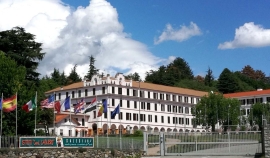After the Cardinal John Cagliero Institute in Ivrea, other missionary aspirantates were established in Italy: Penango, Gaeta, Bagnolo, Mirabello, Novi Ligure, Cumiana, Turin - Rebaudengo, Colle Don Bosco. Then similar aspirantes were also opened in Spain (Astudillo), Great Britain (Shrigley), and France (Coat-an-Doc’h). A good part of missionaries sent to new presences in America and Asia came from these missionary aspirantates.
In the current formation process of the Congregation, the post-novitiate is the formation phase where charismatic identity is deepened. Therefore, it is the phase of formation most suitable for serious missionary discernment and where there is the most lively and generous missionary availability among Salesians. After consulting his spiritual guide, Rector and Provincial, the postnovice can write to the Rector Major presenting his missionary availability.
Today the Salesian Aspirantate is considered as the natural bridge between youth ministry and initial formation. Although there are different forms of Salesian aspirantates (e.g. a growing number of university aspirantates, a few have still senior high school aspirantate, etc.), their primary objective is to accompany young people who express the desire and willingness to discern if God is calling them to be the Salesian life and, hence, willing to embark on a path of verification whether this initial attraction is truly a call from God and whether one has the suitable conditions for accepting it.
The aspirant experiences accompaniment with a view to discernment through a strong community life with fellow aspirants and the accompaniment team, a lived experience of the Salesian Youth Spirituality, initiation to Salesian apostolic activities particularly in missionary situations so that he could mature as a man and a Christian. Thus, the aspirant is helped to discover if God’s call for him is to the Salesian life, or to something else, then guided to it.
Thus, today, more than having ‘missionary’ aspirantates, it is important that aspirants have meaningful missionary experiences, particularly involvement in some form of missionary volunteering. An accompanied meaningful missionary experience fosters in the aspirant a deeper awareness that Salesian consecrated life implies giving oneself generously in the service of others especially the poorest, availability and self-sacrifice. These are important elements in the discernment of every aspirant.
Questions for reflection and sharing:
How can we stir up interest among the young the desire and willingness to discover God’s call for them?
How can we create a strong missionary sensitivity in our EPC?
Fr Alfred Maravilla,
General Councillor for Missions


